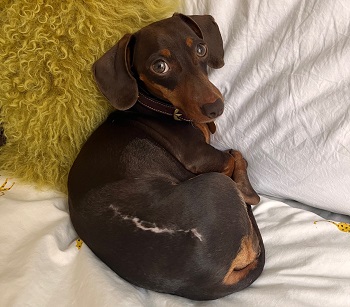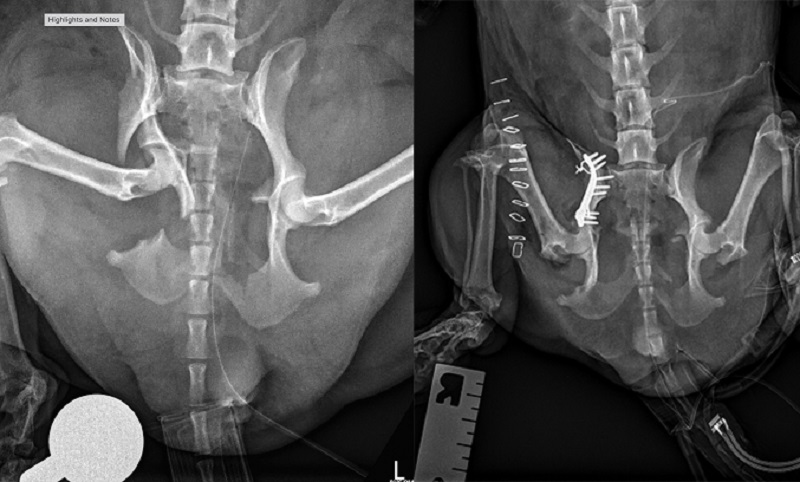Dachshund Bounces Back After Being Hit by a Bike
Clinical Connections – Spring 2023
A miniature dachshund severely injured when run over by a bicycle made an incredible recovery after being treated and cared for at the Queen Mother Hospital for Animals (QMHA).

Injuries sustained by two-year-old Frida during last year’s accident included pelvic fractures, significant intraabdominal bruising and a urethral rupture.
Such was the extent of Frida’s injuries that euthanasia was discussed as an option when her owners took her to their local vets. However, the family decided they wanted to give her a fighting chance and so she was referred to the RVC.
Frida was an inpatient for just over a week, at the end of June last year. During that time she received treatment and care initially from the emergency critical care team, followed by both the Soft Tissue Surgery Service and Orthopaedic Service.
On the day of her admission, further investigations (a positive contrast retrograde urethrocystogram) revealed a rupture of her proximal urethra. Following this, an exploratory laparotomy was performed, and two longitudinal proximal urethral tears (2cm) were identified and repaired. This was a challenging surgery, and the team was concerned for the development of a urethral stricture postoperatively. A cystostomy tube and urinary catheter were placed in the bladder. Frida recovered well in the ICU following this surgery.
The following day, as Frida had recovered well, she had a right ilial body fracture repaired with our Orthopaedic Service. She recovered again in the ICU before moving to the dog ward.

Two days later her indwelling urinary catheter was removed and the day after that she began to urinate well on her own. A retrograde urethrocystogram was repeated a week after admission, which showed no leakage from her urethra or bladder.
Frida’s owners were given a graded exercise programme for her upon discharge. This started with five-minute walks on a short lead three or four times a day for the first two weeks before then slowly increasing to 20-minute walks at five to eight weeks postoperatively.
The referring vets removed the cystostomy tube a few days following discharge. She returned to her local vets two weeks after discharge from the RVC for wound assessment and staple removal.
Progress
She returned to the QMHA for re-examination at the end of August. Frida’s owners had been following the exercise plan well and she was making a good recovery. Her owners reported that around once a week a mild fleeting weakness in her right pelvic limb occurred. However, on examination Frida was ambulating well with no appreciable lameness.
She tolerated palpation of the implants well. Examination under sedation was unremarkable, with good range of motion in both hips. Follow-up radiographs showed healing of her ilial fracture with no implant concerns. Frida’s exercise was then allowed to be gradually increased back to normal and she was signed off by the QMHA teams.
More recently, Frida’s family got in touch to update the teams who treated her. Owner Nancy McCartney said: “The teams at the RVC were completely fantastic from day-one. They were kind, understanding, and explained everything to us in as much detail as we needed. The communication from the veterinary surgeons was brilliant. We had daily phone updates from Dr Matthew Simpson, who was just fantastic, which kept us in the loop about Frida’s progress.
“Frida spent the first few weeks at home getting back to eating and sleeping. She had lost a lot of weight post-accident – from 4.4kg to 3.5kg. She slowly gained confidence in walking small distances and her personality definitely came back. Over the months she has improved beyond our wildest dreams. She is pretty much as she was pre-accident. She loves nothing more than chasing her ball on the beach down in Devon and snuggling up under the blanket on the sofa. Considering the position we found ourselves in in June 2022, we cannot thank the amazing team at RVC enough.”
Matt Simpson, ECVS Surgical Resident, commented: “We have really enjoyed hearing about Frida’s progress from her owners – she’s such a resilient little dog!
“The case was a multidisciplinary collaboration between different specialist teams, including Soft Tissue and Orthopaedic Surgery and Critical Care, with veterinary specialists, residents, registered veterinary nurses and veterinary patient care assistants from across different teams all working together to help Frida.”
